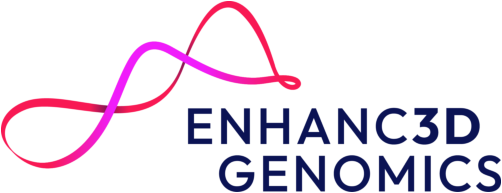Whole-genome 3D structure mapping
Whole genome sequencing studies have revealed over 100,000 disease-linked genetic variants, but the overwhelming majority (95%) are in non-coding regions of the genome (‘gene deserts’). These areas are highly enriched in DNA regulatory elements, such as gene enhancers, that regulate where and when genes are turned on and off.
A major challenge in interpreting the function of these DNA regulatory elements and variants is that they can be located far away (up to millions of base pairs) from the genes they regulate on the linear genomic scale. However, the DNA in each of our cell nuclei is not present in the linear form – it is folded in a manner that differs from cell type to cell type, and it is through this 3D folding of the genome that enhancers come into proximity with the genes they control.
Our proprietary platform analyses genome folding at high resolution for all genes and their enhancers simultaneously, linking gene enhancers and non-coding genetic variants to their target genes, unlocking their potential for therapeutic discovery.
Genetically supported drug targets are twice as likely to succeed in clinical trials (Nelson et al., 2015).
3D multi-omics
Our 3D multi-omics platform (GenLink) is the only genome-wide, hypothesis-free technology able to translate massive amounts of disease-associated variant data into causal biology on a cell-type-specific basis.
This approach can more than double the probability of success for target prioritization and identification – vastly increasing the number of novel disease targets that can be identified, more efficiently and in a fraction of the time previously possible. It also allows the stratification of patients into responder groups to improve and accelerate clinical trials.
Therapeutic Areas
Our technology is uniquely suited to the development of biomarkers, therapeutic targets and treatments for highly complex conditions in which cells exhibit inappropriate patterns of differentiation and protein expression, including many common diseases. We are initially focused on developing a pipeline for autoimmune indications.
